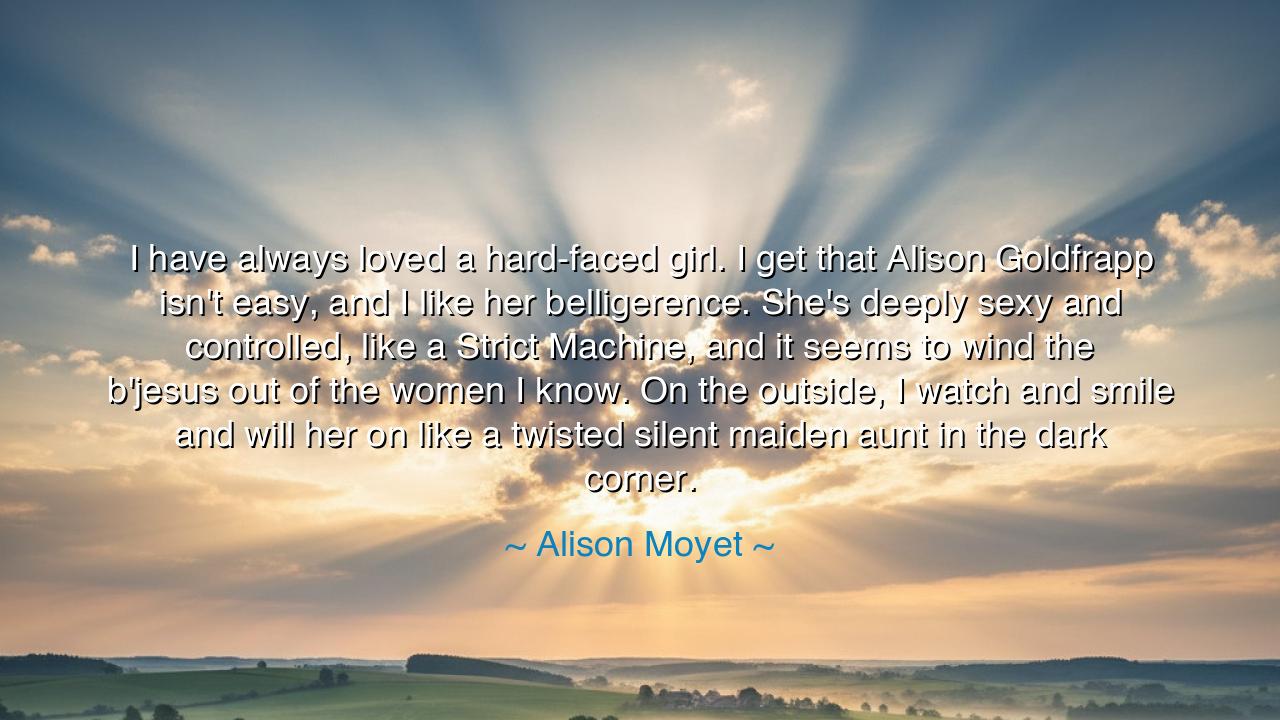
I have always loved a hard-faced girl. I get that Alison
I have always loved a hard-faced girl. I get that Alison Goldfrapp isn't easy, and I like her belligerence. She's deeply sexy and controlled, like a Strict Machine, and it seems to wind the b'jesus out of the women I know. On the outside, I watch and smile and will her on like a twisted silent maiden aunt in the dark corner.






The words of Alison Moyet are wrapped in the garments of admiration and paradox: “I have always loved a hard-faced girl. I get that Alison Goldfrapp isn't easy, and I like her belligerence. She's deeply sexy and controlled, like a Strict Machine, and it seems to wind the b'jesus out of the women I know. On the outside, I watch and smile and will her on like a twisted silent maiden aunt in the dark corner.” At first, it is a portrait of another—an homage to Alison Goldfrapp, fierce and unyielding—but beneath, it reveals an eternal truth: the world is stirred by those who refuse softness where strength is required, those who stand defiant and unafraid to be difficult in a society that often demands compliance.
The hard-faced girl here is not without feeling, nor without humanity. Rather, she is sheathed in armor, forged by her own will, moving with precision and command. In Moyet’s praise, one hears recognition of a rare kind of beauty: not the gentle smile that soothes, but the sharpened gaze that unsettles, that awakens something raw in the soul. To be “deeply sexy and controlled” is not merely to possess allure, but to carry the power of self-mastery, to embody desire without surrendering it, to be the master of one’s flame.
The ancients, too, revered such figures. Recall Athena, goddess of wisdom and war, whose countenance was often described as stern, her gaze steady, her bearing unyielding. She was not adored for docility but for command, not for yielding but for guiding. The sight of her stirred reverence, awe, and even fear. Yet it was this very strength that made her beautiful to those who could see beyond softness. Like Goldfrapp, Athena embodied the paradox of allure and control, a reminder that true power often comes not from pleasing, but from standing unmoved.
Moyet’s words reveal also the tension such strength creates among others. She admits, “it seems to wind the b’jesus out of the women I know.” For strength in one woman can stir unease in another, when society has long whispered that women must be compliant, tender, and pleasing above all. The belligerence Moyet celebrates is a rebellion against those whispers, a declaration that one can be commanding and alluring without apology. It is no wonder, then, that she wills Goldfrapp on “like a twisted silent maiden aunt in the dark corner”—for to see someone embody what one has long been denied is both liberating and unsettling.
The origin of such attraction lies deep within the human psyche. The controlled spirit, the one who does not bend to the gaze of others, awakens in us both admiration and challenge. It reminds us of what we might be if we too cast aside fear. This is why the “hard-faced girl” has always existed in myth and history: the warrior queens, the uncompromising artists, the rebels who refused to soften themselves to fit the mold. They are not loved by all, but they are remembered by all.
And so the lesson is this: admire not only the gentle, but also the strong. Learn to see beauty in defiance, in control, in the refusal to bow. For the world does not move forward by sweetness alone; it is shaped also by those whose sternness unsettles, who dare to wear the hard face when the soft one would be easier. To honor such strength is to honor courage, individuality, and self-command.
Practically, this calls us to encourage strength in others rather than diminish it. When you meet one who is uncompromising, resist the urge to tame them with comfort or scorn. Instead, will them on, as Moyet does from her darkened corner. Celebrate those who dare to stand apart, for their very existence stretches the boundaries of what is possible. And within yourself, do not fear to embody the hard face when needed—when truth must be spoken, when dignity must be held, when the world seeks to bend you into silence.
For in the end, the hard-faced girl is not simply a person—she is an archetype, a reminder. She tells us that beauty need not always smile, that allure can come clothed in sternness, and that power is often sexiest when it is most controlled. Let us, then, honor those who walk this path, and let us learn from them: that to be fully human is not only to be gentle, but also to be fierce, unyielding, and gloriously alive.






AAdministratorAdministrator
Welcome, honored guests. Please leave a comment, we will respond soon